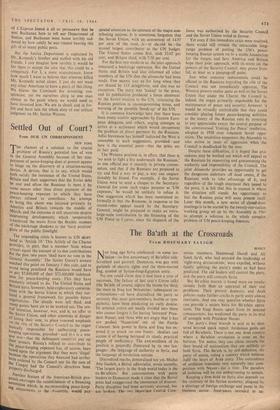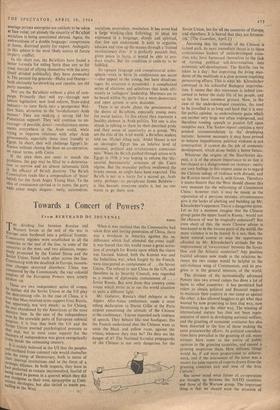The Ba'ath at the Crossroads
From ROSEMARY SA YIGH
BEIRUT
NOT long ago Syria celebrated—in some iso- lation—its first anniversary of Ba'athist rule. Scrubbed and painted, Damascus was gay with garlands of electric lights and the three-starred flag, symbol of Syrian-Iraqi-Egyptian unity.
No one could claim that it had been a year of successes. The failure of last year's Union talks (the Ba'ath, of course, rejects the blame for this); the mess in Iraq last November; subsequent re- criminations—all have discredited the party so seriously that most non-members, hostile or sym- pathetic, have been predicting an early demise. Its severest critics are neatly divided into those Who cannot forgive it for having 'betrayed' Presi- dent Nasser, and those who are angry that it has not pushed 'Nasserism' out of the Fertile Crescent. Sole power in Syria and Iraq has ex- posed it to attack on two fronts: idealists can accuse it of having betrayed its ideals, practical people of inefficiency. The awkwardness of its position is pointedly illustrated by its two lan- guages: .the language of authority in Syria, and the language of revolution outside.
Discredited maybe, demoralised not yet. Michel Abu Jaudeh, a Beirut editorialist, wrote recently, 'The largest party in the Arab world today is the ex-Ba'athists.' But conversations with party leaders in Damascus made it clear that the Beirut press had exaggerated the imminence of disaster. Party discipline had been seriously strained, but not broken. The two important Central Corn- mince members, Hammond Shoufi and Ali Saleh Sa'di, who had accused the leadership of 'right-wing deviationism,' were expelled, without fatally splitting the party's ranks as had been predicted. The old leaders still control the p/trtY, and the party still controls Syria.
But Ba'athist morale is based more on revolu- tionary faith than an appraisal of their real problems. Their present domestic and Arab policies make further cracks in party unity almost inevitable. And one may question whether Syria can provide a secure basis for Ba'athist opera- tions. The Iraqi fiasco, apart from its internal consequences, has weakened the party in its trial of strength with President Nasser.
The party's Iraqi branch is said to be shat- tered beyond quick repair. Jordanian gaols are full of Ba'athists. There is not one Arab country where a Ba'athist revolution is even on the horizon. Yet unless they can claim recruits for their brand of nationalism they are unlikely to , hold Syria. The Ba'ath is, by self-definition, the party of union, ruling a country which believes itself the heart of Arab unity. This coincidence of ambition translates very naturally into com- petition with Nasser—for a time. The paradox of isolation will be too embarrassing to sustain.
Keeping a firm hold on Syria also depends on the recovery of the Syrian economy, plagued by a shortage of foreign exchange and panic in the business sector. Assurances intended to en- courage private enterprise are unlikely to taken at face value, yet already the sincerity of Beathist socialism is being questioned abroad. Again, the awkwardness of a double language: compromise m export. e, doctrinal at home, purity for expo. Ambiguity in this sphere is the most likely source of future In-party conflict. In the short run, the Ba'athists have found a better formula for ruling Syria than any so far tried. Instead of allying themselves with the army (itself divided politically), they have permeated It. The present top generals—Hafez and Omran- both obviously hardworking and capable, are old party members. Nor are the Ba'athists without a plan of cam- paign. Primarily they will try—through new labour legislation, new land reform, State-aided industry—to turn Syria into a prosperous Wel- fare State, attractive to the 'revolutionary Arab masses.' They are making a strong bid for Palestinian support. They will continue to en- courage—if possible, direct—revolutionary move- ments everywhere in the Arab world, while trying to improve relations with other Arab governments, especially those least friendly to Egypt. In short, they will challenge Egypt's in- fluence without closing the'door on co-operation, on equal terms, with Cairo. If the plan does not seem to match the problems, the gap may be filled by a determina- tion to survive and an almost talismanic faith In the efficacy of Ba'ath doctrine. The Ba'ath Constitution reads like a compendium of 'must' beliefs for the Arab Angry Young Man. To the idea of renaissance carried in its name, the party adds other magic slogans: unity, nationalism, socialism, neutralism, revolution. It has never had a large working-class following; its ideas are expressed in a language, cloudy and spiritual, that few can understand. It aims to organise, educate and raise up the masses through a 'trained revolutionary elite.' It is perfectly possible that, given peace in Syria, it, would be able to pro- duce results. But the condition is unlikely to be fulfilled. Its opaque language and conspiratorial atmo- sphere—even in Syria its conferences are secret —also appeal to the young, but have disadvan- tages. Its structure is pyramidal: a complicated series of elections and selections that leads ulti- mately to 'collegiate' leadership. Murmurs are to be heard within the party that a more democratic and open system is now desirable. There is no doubt about the genuineness of the desire of Ba'athists, especially young ones, for social justice. To this extent they represent a healthy element in Arab politics. Yet one is also struck in talking to them by their doctrinal pride and their sense of superiority as a group. 'We are the elite of the Arab world,' a Ba'athist student told me. Michel Aflaq said, 'Abdel Nasser is not an ideologist. Egypt has an -Inferior level of national, political and revolutionary conscious- ness.' When the Ba'ath pushed through union with Egypt in 1958 it was hoping to reform the 'dic- tatorial bureaucratic' structure of the Cairo regime. But the muscular python swallowed the brainy mouse, as might have been expected. The Ba'ath is not in a hurry for a second go. Arab unity, perhaps—to paraphrase James Baldwin— is like heaven; everyone exalts it, but no one wants to go there now.







































 Previous page
Previous page